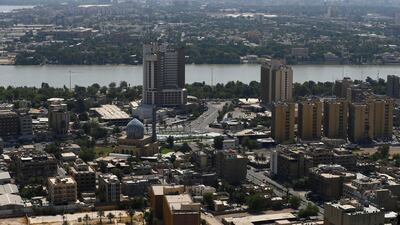Iraq, the second-biggest oil producer within the Opec group, is substantially exposed to fiscal risks related to guarantees issued by the state to support investment in the country, according to a new report from the International Monetary Fund.
At end of June 2017, the stock of guarantees related to foreign currency service payments and debt amounted to $21.7 billion, representing 12 per cent of the country’s gross domestic product (GDP), the IMF said. This includes $19.4bn for service payments to independent power producers (IPPs) by state-owned electricity companies and $2.3bn of debt.
However, the understanding of the specific risks from guarantees is limited, and the scale of domestic-currency guarantees has yet "to be fully assessed", the Washington-based lender said. Lots of government entities issued guarantees over the past 15 years, including a number during 2009-11 that the Ministry of Finance "has limited information on".
“To ascertain the government’s exposure to risks from guarantees, a comprehensive guarantees registry should be developed. All relevant stakeholders should be required to provide information on guarantees and corresponding claims to the Ministry of Finance,” the IMF said.
The government should also "develop capacity and dedicate time and resources to understand the risks it is taking when guaranteeing certain transactions", it added.
In 2016, in the context of the shocks resulting from the conflict with ISIS and the drop in oil prices, the government started to significantly expand its use of guarantees, mostly to support investment in the electricity sector but also to make military purchases, for direct lending by state-owned banks to private sector infrastructure and agriculture projects, and to repair the Mosul dam.
Guarantees include backstops for loans to state-owned Enterprises (SOEs), extra-budgetary funds (EBFs) such as the Housing Fund and borrowing by project companies, guarantees of power purchase agreements (PPAs) between independent power producers and state-owned electricity companies and asurances on letters of credit.
“The state guarantee on a debt of 1.4 per cent of GDP contracted by the National Investment Committee (NIC) 2013 and 2016 for a housing project in the city of Bismayah was not included in gross public debt at end-December 2016,” it said.
In addition, authorities also recently identified five additional guarantees representing 0.8 per cent of GDP that were not disclosed previously accounted for and the approval of a guarantee that did not follow procedures in 2017.
A policy framework should be developed on the issuance of guarantees to strengthen financial controls, the IMF said.
Iraq's economy is estimated to have shrank by 11 per cent last year – the country's worst performance since 2003 – as it dealt with the twin shocks of low oil prices and the Covid-19 pandemic, the IMF said in December. It estimated the country's fiscal deficit widened to 20 per cent of GDP last year.
With limited capital inflows, Iraq's official reserves declined by about $14bn to $9bn, the Institute of International Finance said in a report last month.
Iraq devalued its currency by about 23 per cent against the US dollar on December 20. The Central Bank of Iraq set the exchange rate at 1,450 dinars per dollar, from a peg of 1,182 dinars, for sales to the finance ministry. The dinar is being sold to the public at 1,470 and to other banks at 1,460.
The size of last year's deficit and the devaluation means government debt is likely to have soared to about 94 per cent of GDP last year, from 54 per cent in 2019, the IIF said.
It forecasts a modest return to growth of 1.6 per cent for the country's economy this year, rising to 3.1 per cent in 2022 due to "a significant improvement in oil exports and a recovery of public investment", which fell by more than 50 per cent last year.


